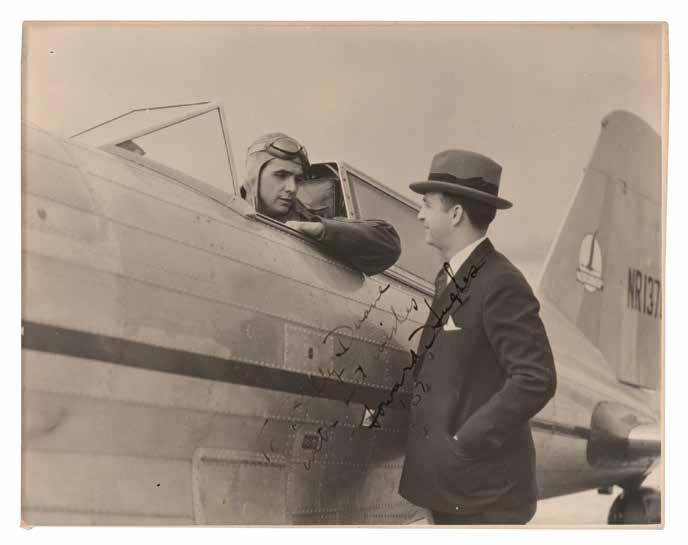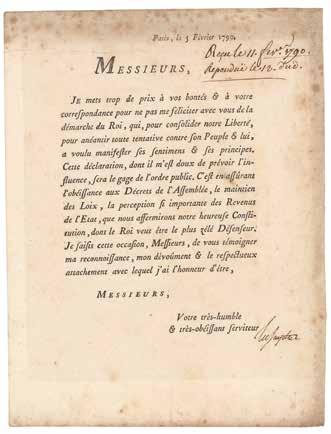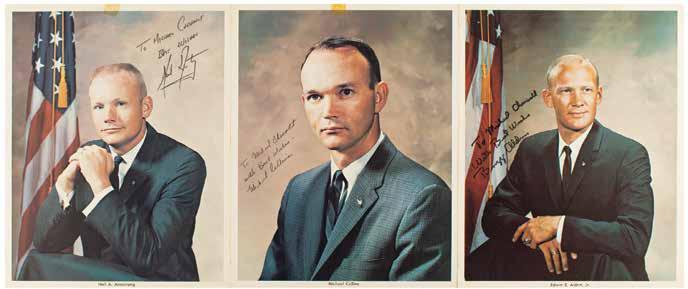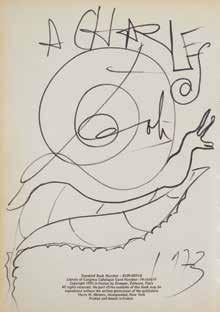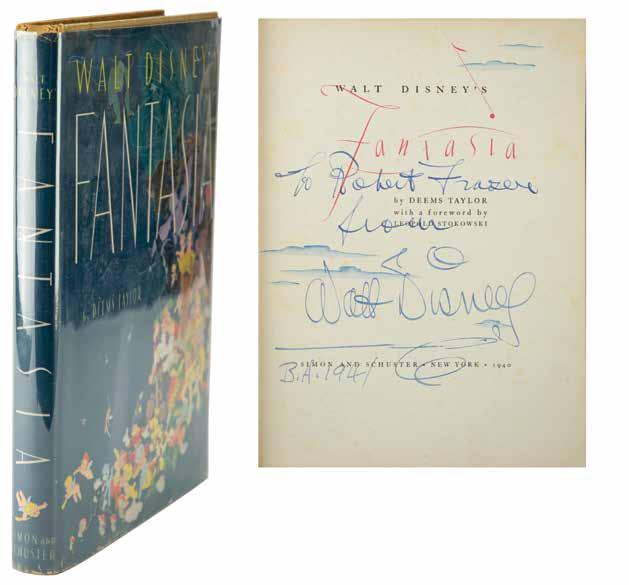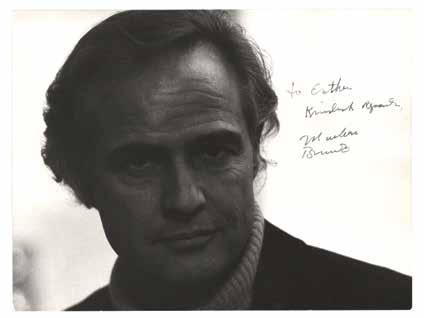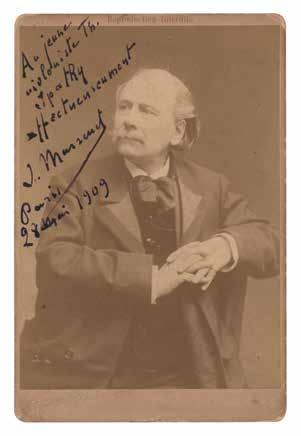
9 minute read
Literature
Complete run of The American Museum, published by Mathew Carey from 1787 to 1792
241. The American Museum Books. Highly desirable complete run of The American Museum in twelve leatherbound volumes, originally published in Philadelphia by Mathew Carey from January 1787–December 1792. These volumes contain mixed editions, with third editions of Volume 1, No. 1–3 (January–March 1787); second editions of Vol. I, No. 4–6 (April–June 1787), Vol. 2, No. 1–6 (July–December 1787), and Vol. 3, No. 1–6 (January–June 1788); and first editions of the rest (Vol. 4–Vol. 12). The fold-out plates (e.g. the map of the Gulf Stream and Plan of African Ship’s Lower Deck) are absent. Also includes Carey’s The American Museum for the Year 1798; or Annual Register of Fugitive Pieces, Native and Modern, in a matching binding. In overall good to very good condition, with heavy wear to spines, partially missing spine labels, flaking to leather, cracked joints, and staining and toning to textblocks.
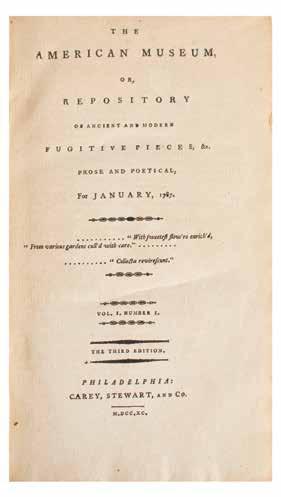
Published by Mathew Carey in Philadelphia, the American Museum was one of the first successful literary magazines in the United States: it published poetry, political columns, and news on affairs international and domestic. Included on the subscriber lists published herein are names like Benjamin Franklin, Thomas Jefferson, James Madison, and George Washington, all of whom were also contributors. The September 1787 magazine (represented here as a second edition), included the first periodical printing of the United States Constitution. Early printings of the Federalist Papers were published in the American Museum, and in it reported the proceedings of the first Congress, along with the debates over the adoption of the Bill of Rights in 1789. Starting Bid $500
Fitzgerald seeks solace in Ashville’s clean mountain air while struggling with finances and his wife’s mental health
242. F. Scott Fitzgerald Typed Letter Signed. TLS signed “Scott Fitzgerald,” one page, 8.5 x 11, October 22, 1936. Letter to his secretary Isabel Owens, written from the Grove Park Inn in Asheville, North Carolina. In part: “I am going North without fail for Thanksgiving and spend at least one day in Baltimore trying to get things in better shape...There is a lot I want to talk over with you. It would be nice if you could tell me where certain articles are that I stored: my wife’s skating skirt Scotty has been wearing, and my wife’s two pairs of skiing boots—the tall ones from Quebec and the ones from Switzerland...It will save time if you will in the meantime have gotten in touch with the Storage Company and perhaps have been able to make a visit there to see that in that gray bandbox of Zelda’s there are the brush and mirror.” In fine condition, with a light paperclip impression to the top edge. Fitzgerald spent time at the Grove Park Inn, situated in Asheville, North Carolina, during the summers of 1935 and 1936, recuperating from ill health in the clean mountain air. While staying there in 1936, he helped to oversee his wife Zelda’s transition from the Phipps Clinic at Johns Hopkins in Baltimore to the Highland Hospital in Asheville. Starting Bid $500
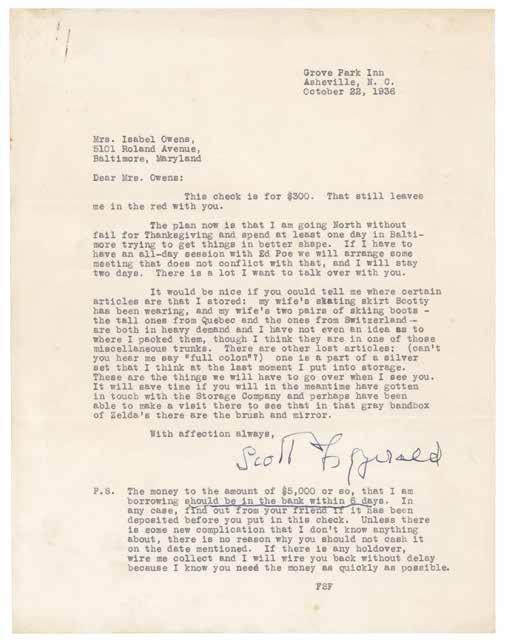
Having secured a poem from the youthful “Henry D. Thoreau,” Emerson solicits contributions for The Dial
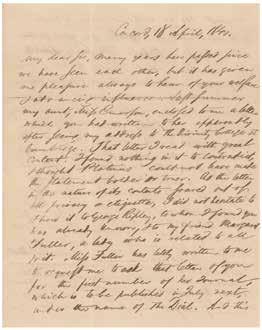
243. Ralph Waldo Emerson Autograph Letter Signed. Handwritten letter by Ralph Waldo Emerson (signature clipped out and absent), four pages on two adjoining sheets, 7.75 x 9.5, April 18, 1840. Letter to Rev. Thomas T. Stone in East Machias, Maine, soliciting contributions to Margaret Fuller’s newly founded journal, The Dial. Emerson writes that it has “a few anonymous correspondents on whose writings I set a high value. Henry D. Thoreau, a youth teaching a school in this town, has given me for her a beautiful poem. I have promised her some contribution for each number for a year.” In very good condition, with splitting to the intersecting folds, an edge tear and seal-related paper loss, and Emerson’s signature clipped off (and his name added in an unknown hand). Starting Bid $200
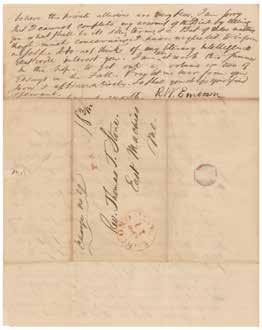
Superb triple-signed check from Kerouac
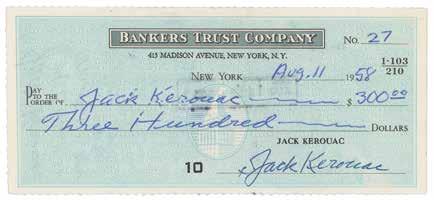
244. Jack Kerouac Triple-Signed Check. Personal check, 6.25 x 2.75, filled out and signed by Kerouac, “Jack Kerouac,” payable to “Jack Kerouac” for $300, August 11, 1958, endorsed on the reverse, “Jack Kerouac, 34 Gilbert St., Northport, N.Y.” In fine condition. A superb example signed three times by the Beat Generation legend. Starting Bid $200
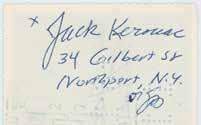
Image larger than actual size.
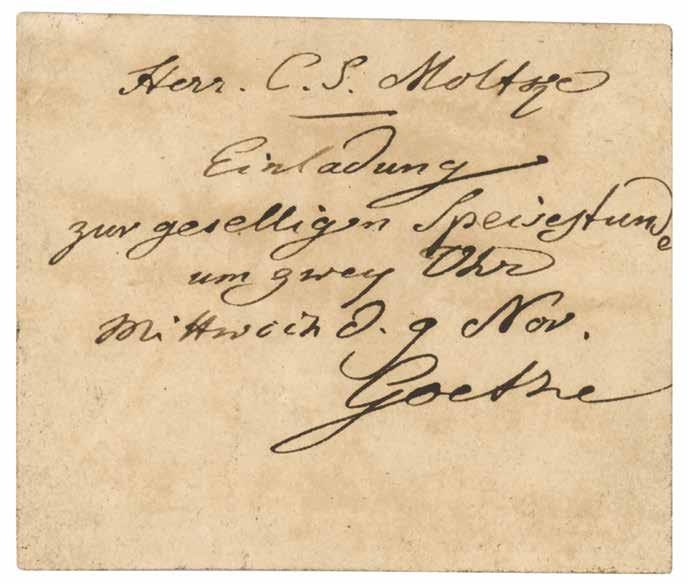
245. Johann Wolfgang von Goethe Signed Invitation. Rare handwritten invitation in German from Johann Wolfgang von Goethe, signed “Goethe,” one page, 4 x 3.25, presented to singer and composer Karl Melchior Moltke, in full (translated): “Sir. C. S. Moltke, invitation, for a sociable meal at two o’clock, Wednesday the 9 Nov. Goethe.” Dated on the reverse in another hand: “Anno 1825.” In fine condition, with trimmed edges and lightly mottled toning. A warmly penned invite from the great German scribe. Starting Bid $500
246. Jean de La Fontaine Document Signed. One of the most famous French poets of the 16th century (1621–1695) widely known for his collections of fables. Untranslated manuscript DS in French, signed “De La Fontaine,” one page, 7.25 x 8, December 18, 1657. In fine condition. Starting Bid $300
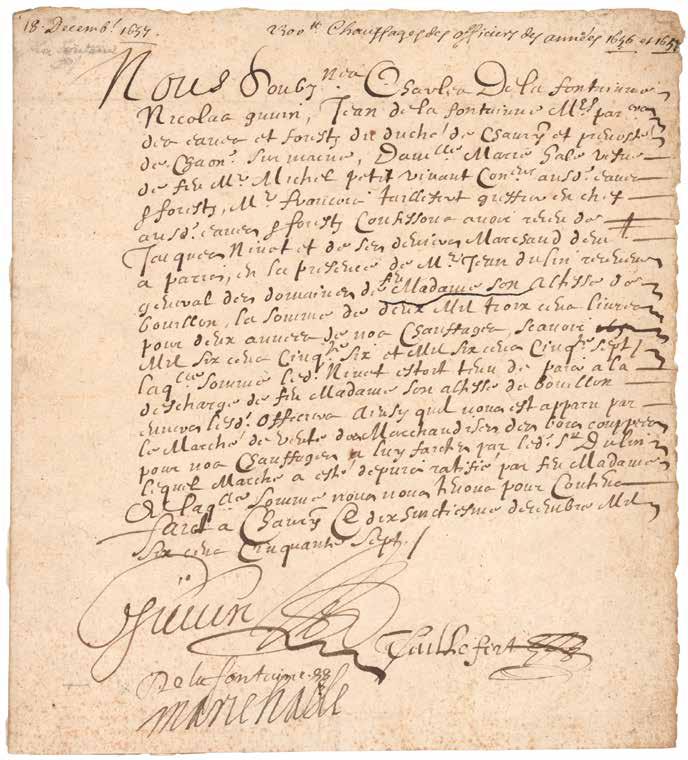
Choice autograph letter by Herman Melville, breezily taking an advance on his historical novel Israel Potter
247. Herman Melville Autograph Letter Signed. Scarce ALS signed “H. Melville,” one page, 4.75 x 6.75, November 25, 1854. Melville writes to his publisher, G. P. Putnam & Co. in New York. In full: “I have taken the liberty to draw on you today at three days’ sight for Sixty Dollars ($60); about which sum will probably be due on Dec: No: of ‘Israel Potter.’” The book, Melville’s only historical novel, was based on the eponymous Revolutionary War hero (1744-1826); among the historical figures who make cameos in the story are George III, Benjamin Franklin, and (through Melville’s imaginative license) Ethan Allen and John Paul Jones. In fine condition, with a trimmed left edge, and a tiny repair to the upper left corner. A gorgeously penned and perfectly preserved example that looks as fresh as the day it came from the great author’s pen. Starting Bid $1000
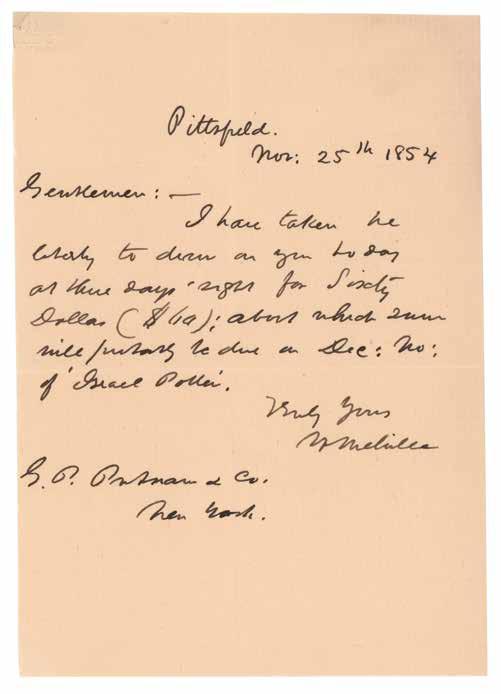
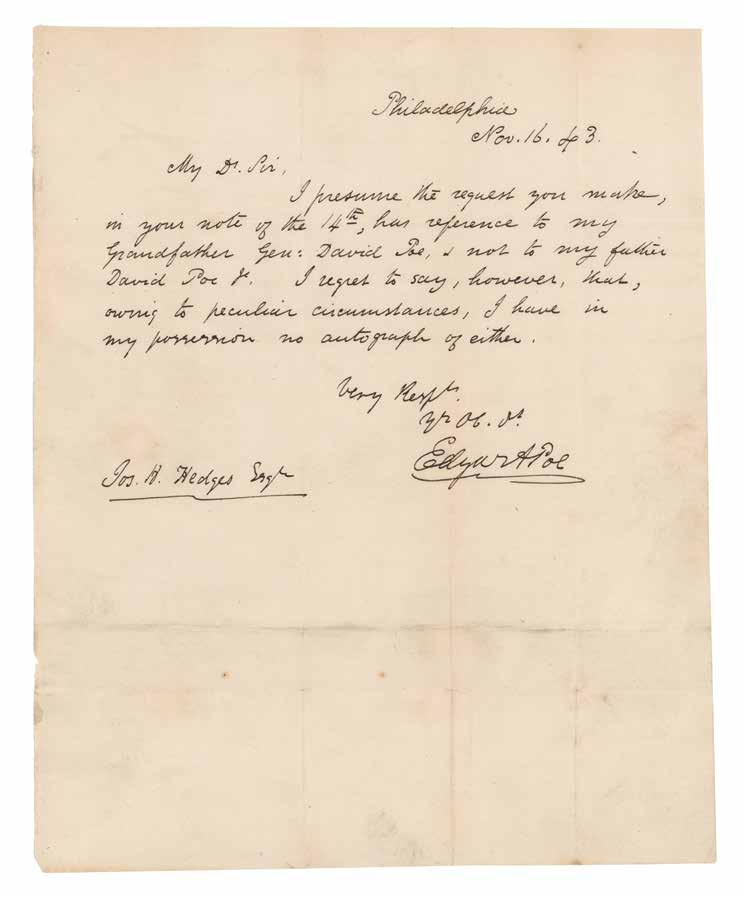
Documented by the Edgar Allan Poe Society, a rare letter on the autographs of his ancestors, “Gen: David Poe” and “David Poe Jr.”— “Owing to peculiar circumstances, I have in my possession no autograph of either”
248. Edgar Allan Poe Autograph Letter Signed. Remarkable ALS signed “Edgar A. Poe,” one page, 8 x 9.75, November 16, 1843. Letter to Joseph H. Hedges, in full: “I presume the request you make, in your note of the 14th, has reference to my grandfather Gen: David Poe, & not to my father David Poe Jr. I regret to say, however, that, owing to peculiar circumstances, I have in my possession no autograph of either.” In fine condition, with light show-through at the left edge from an old tape fragment on the reverse.
The recipient, Joseph H. Hedges (ca. 1828-1905) was an early collector of autographs in Philadelphia, clearly seeking the signature of the author’s ancestor: either David Poe, Sr., a quartermaster during the American Revolution, or David Poe, Jr., a little-known stage actor. Poe ponders the possibility of both, concluding that his grandfather—who contributed his personal wealth to the patriot cause, earning the esteem of the Marquis de Lafayette and the honorary title of ‘General’—would have been more well known to the public.
The “peculiar circumstances” of Poe’s upbringing resulted in his having none of their papers. His father, David Poe, Jr., abandoned the family when Edgar was an infant, and died shortly thereafter. His mother, Elizabeth Arnold Hopkins Poe, died just before he turned three, and the three Poe children were split up into three separate households. Young Edgar, taken in by John and Frances Allan (and christened with their surname as his middle name), would have had little in the way of family heirlooms.
By the time he penned this letter, Poe, then a magazine editor living in Philadelphia, had already written some of his bestknown horror and mystery tales, including ‘The Fall of the House of Usher,’ ‘The Masque of the Red Death,’ and ‘The Pit and the Pendulum’; in the same year, he wrote his timeless cryptological classic, ‘The Gold Bug.’ Boldly penned and boasting a large, clean signature, this is a stunning example of an autograph letter by America’s master of the macabre.
This letter has been documented by the Edgar Allan Poe Society of Baltimore. Starting Bid $5000
The reclusive Pynchon’s contract for a Swedish version of his second novel, The Crying of Lot 49
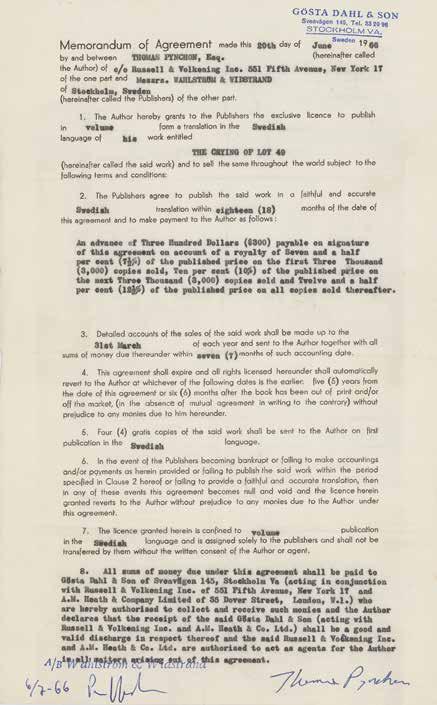
249. Thomas Pynchon Document Signed. DS, signed “Thomas Pynchon,” one page, 7.75 x 12.75, June 20, 1966. Memorandum of an agreement in which Pynchon grants the publishing company Wahlstrom & Wystrand license to publish a Swedish translation of his book The Crying of Lot 49 for “an advance of Three Hundred Dollars…payable on signature of this agreement,” plus a graduated schedule of royalties based on the published price of books sold. Signed at the conclusion in blue ballpoint by Pynchon. In fine condition. Given Pynchon’s well-publicized reputation as one of the literary world’s most reclusive novelists, any item directly related to the author exists unto itself as a unique find, with signed items being of the utmost rarity. A tremendous document from early in the great writer’s career. Starting Bid $500
Scarce handwritten literary letter by Oscar Wilde, offering his service to a fellow author
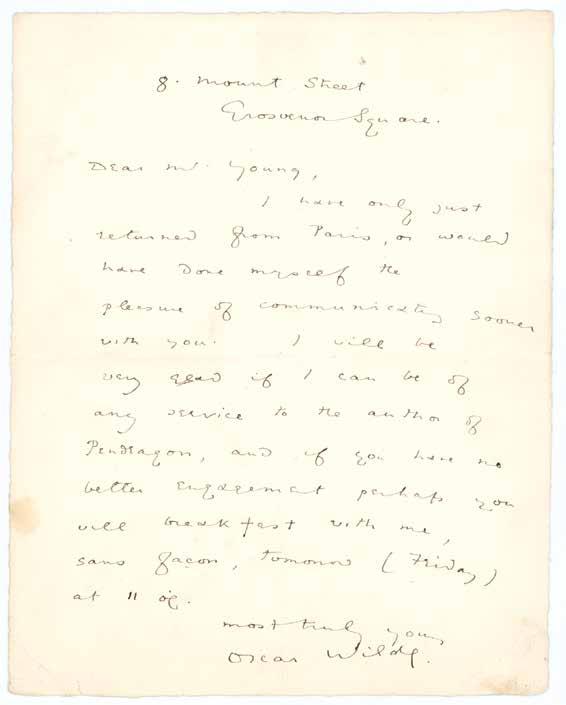
251. Oscar Wilde. Irish writer (1854–1900) and leader of the Aesthetic Movement, and author of such works as The Picture of Dorian Gray, The Importance of Being Earnest, and The Happy Prince. ALS, one page, 7.5 x 9.5, no date. Letter to “Mr. Young,” written from “8 Mount Street, Grosvenor Square.” in full: “I have only just returned from Paris, or would have done myself the pleasure of communicating sooner with you. I will be very glad if I can be of any service to the author of Pendragon, and if you have no better engagement perhaps you will breakfast with me, sans facon [informally], tomorrow (Friday) at 11 o’ c.” In fine condition, with a small stain to the left edge. Handwritten letters from Wilde are few and very far between! Starting Bid $300

